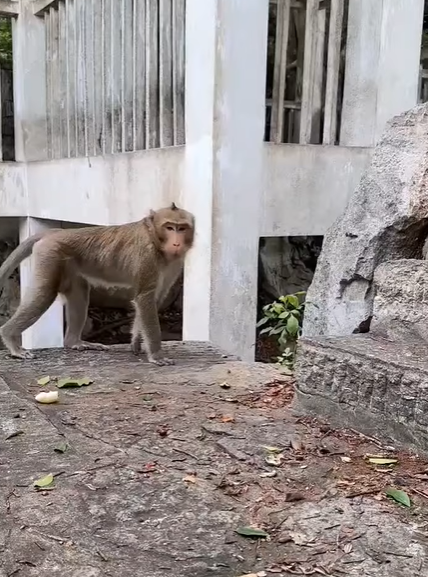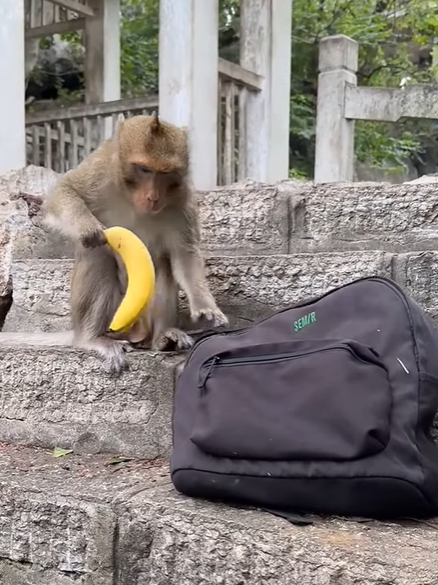
It was another bright, sunny morning in the forest, and the trees swayed gently in the breeze. Birds chirped their cheerful songs, and the river gurgled softly as if whispering secrets to anyone who would listen. But today, there was an unusual kind of buzz — one that wasn’t coming from the birds, the river, or the wind. No, this was the sound of Cutis, the cheeky monkey, giggling and stomping his little feet as he dashed toward his favorite part of the day: breakfast.
And not just any breakfast — food that could make a grown gorilla blush.
“Wake up, Cubis!” Cutis shouted, shaking his younger monkey brother awake. “I heard the humans left a bunch of bananas in the market! And mangoes! And… oh, maybe some peanuts too!”
Cubis groaned, rubbing his sleepy eyes. “Cutis, it’s barely morning. Can we just eat some leaves or berries like normal monkeys?”
Cutis’s eyes widened in horror. “Leaves? Berries? That’s what other monkeys do! We, my dear brother, are food adventurers! Come on! We’re going on a mission!”
With that, he leapt from the branch he was perched on, landing nimbly on the ground with a soft thud. Cubis followed reluctantly, shaking his head at his older brother’s boundless energy.
🐒 The Great Market Raid
The forest path led to the village market — a bustling area filled with colorful stalls, chattering humans, and delicious smells wafting through the air. Cutis’s nose twitched with excitement as he caught the scent of freshly baked bread, juicy mangoes, and sticky sweet honey.
“First, we have to scout the area,” Cutis whispered, crouching behind a pile of wooden crates. “No one suspects the foodie brothers… yet.”
Cubis peeked around the corner nervously. “Cutis… are you sure this is a good idea? Humans can be… unpredictable.”
Cutis grinned mischievously. “That’s what makes it fun!”
And fun it was. With incredible agility, Cutis leapt from stall to stall, sniffing, sampling, and occasionally juggling fruits in the air — much to the humans’ surprise. A few nearby children pointed and laughed. “Look! The monkeys are eating the mangoes!”
Cubis, however, had a slightly different experience. Every time he tried to grab a piece of fruit, Cutis swooped in. “No, no, no! That mango is mine! You can have this tiny berry if you want, little bro!”
Cubis huffed, rolling his eyes. “You love food a little too much, Cutis.”
Cutis paused dramatically, clutching a banana like a prized treasure. “A little too much? There is no such thing as too much food!”
🍌 Banana Battles and Mango Madness

By now, Cutis had amassed a small mountain of bananas, mangoes, and even a few peanuts he had carefully stolen from an unsuspecting stall. He stacked them high, cackling gleefully.
“Cubis! Behold! The Banana Tower of Glory!” he announced proudly.
Cubis approached cautiously. “Is it really necessary to pile all of that? What if it falls?”
Cutis waved his hand dismissively. “Pfft! Nonsense! I have built this tower with precision, care, and… well, a little bit of chaos. But that’s part of the fun!”
Of course, as he finished speaking, a gust of wind came and knocked half the tower over. Bananas rolled across the market floor, mangoes tumbled into a basket, and Cutis shrieked in mock horror.
“NOOOOO! My glorious tower!” he cried, diving onto the fallen fruit, trying to salvage as much as he could.
Cubis couldn’t help but laugh. “You see? That’s why I said you love food too much!”
Cutis paused, looking up with a banana peel on his head. “Maybe,” he said slowly. “Maybe… but you also love it too little! Come on, Cubis, live a little!”
🥭 The Sneaky Snack Heist
As if on cue, Cutis’s eyes caught a sight that made him drool instantly — a basket of ripe, golden mangoes sitting unattended on a table. His tail twitched with excitement.
“Cubis,” he whispered, “this… is our moment.”
Cubis groaned. “Cutis, we’re literally stealing now…”
“Technically,” Cutis said, “we’re reclaiming food for the forest. The mangoes are calling us, Cubis!”
With incredible stealth, Cutis leapt onto the table, grabbing a mango with a triumphant “Yes!” Cubis, being slightly more cautious, managed only a small fig.
Cutis held the mango high. “Victory is sweet! Literally sweet!”
The humans nearby had noticed the antics by now. One of the vendors laughed. “Those monkeys are at it again! Look at them go!”
Cutis waved the mango like a trophy. “Yes! Witness our greatness!”
Cubis shook his head, laughing despite himself. “You are hopeless, Cutis. Hopelessly in love with food!”
🥜 The Peanut Predicament

After the mango heist, Cutis spotted a small bag of peanuts lying nearby. He lunged for it, but in his excitement, he tripped over a basket, sending peanuts flying in all directions.
“Uh-oh…” Cubis said, as Cutis rolled on the ground laughing, trying to scoop up as many as possible. Some peanuts ended up in Cutis’s mouth, some in his fur, and some… well, they went flying like tiny cannonballs.
A small group of children gathered around to watch, cheering for the “foodie monkey.” One little girl shouted, “He’s so funny! Look at all the peanuts!”
Cutis paused mid-laugh to toss a peanut toward her. “Catch!”
The girl squealed with delight as the peanut landed perfectly in her hands. Cutis beamed. “See, Cubis? Food brings joy to everyone!”
Cubis sighed, shaking his head. “Yes, yes… even when it makes a mess of everything!”
🐾 The Great Escape
By now, the market was buzzing with laughter and applause. People were taking pictures and videos of the monkey brothers, who were clearly enjoying themselves a little too much. Cutis, with his mango in one hand and a banana in the other, looked around.
“Cubis!” he shouted. “Time to retreat with our spoils!”
Cubis climbed onto Cutis’s back. “Cutis, you can’t carry all of that alone!”
“Of course I can!” Cutis declared. “I am the master of food transport!”
And with that, they dashed back into the forest, leaping from tree to tree, dropping mangoes and bananas like confetti, and laughing all the way. The humans watched in awe, still clapping and laughing at the chaos the monkeys had created.
🌳 The Feast in the Forest

Finally, safe in their favorite clearing, Cutis and Cubis sat down for the feast they had dreamed about all morning. Mangoes, bananas, peanuts, and even a stray coconut — their table was a glorious mess of deliciousness.
Cutis took a big bite of banana and sighed happily. “Ah… life is perfect.”
Cubis nibbled on a mango slice, shaking his head. “You really do love food too much, Cutis.”
Cutis paused, thinking deeply. “Maybe. But food is love, Cubis. Food is adventure. Food… is happiness!”
Cubis laughed. “Alright, I guess you have a point. But don’t eat ALL of it this time, okay?”
Cutis’s eyes twinkled. “No promises!”
And with that, he dove into the feast once more, tossing bits of fruit into the air, catching them with expert precision, and making Cubis laugh until his belly hurt. The forest was filled with giggles, crunches, and the joyful chaos of two monkeys who truly lived for food and fun.
😂 The Legend of the Foodie Brother
From that day forward, Cutis earned a new title among the forest animals: The Ultimate Foodie Monkey. Every day, he could be found planning daring raids, tasting every fruit, and turning every meal into an adventure. Cubis, though a little more cautious, joined in — after all, life was always more fun with his foodie brother around.
Animals from all over the forest would whisper: “Watch out! Cutis is on a food mission!” And when Cutis appeared, everyone knew laughter and chaos were sure to follow.
Because one thing was certain: Monkey Brother loves food a little too much… and the whole forest couldn’t help but enjoy the show! 🐒🍌🥭🥜



